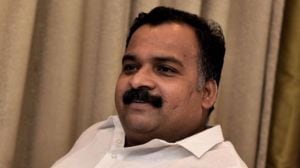IT minister, here146;s connectivity
The UPA government is replete with technocrats including, of course, Dayanidhi Maran, the communications and information technology minister...

The UPA government is replete with technocrats including, of course, Dayanidhi Maran, the communications and information technology minister. In his first day at office he listed ten points as his agenda to bolster a telecom and IT revolution in the country. None of them are new. These measures have, in fact, been pursued by governments at the Centre for the last several years and were responsible for the large mobile penetration and the fact that the internet is now available across the country.
At the same, time, there has been little progress in this sector in terms of infrastructure and services. The minister, therefore, needs to work on 10 broad areas: achieve convergence of information, communication and media technologies; bring about transparency in administration; expedite broadband connectivity; introduce next generation mobile wireless technology; set up a national internet exchange and Indian domain names; migrate to the new internet protocol, IPV6; introduce security and digital signatures; set up a Media Lab Asia; introduce language computing; extend the outsourcing of skilled manpower and develop R038;D.
These ten points fall into four broad categories: one, provision of solutions to ensure that IT and communication connectivity reach new areas and the hinterland in a cost-effective manner. Two, initiatives to innovate and improve technological solutions. Three, solutions for creating value like improving the security of the internet and, finally, enhancing the market for Indian IT services.
In the wake of the recent reverses in the IT savvy states of Andhra Pradesh and Karnataka, there is the growing feeling that the common man is still not enthused by IT. As a result, other states that were beginning to see a value in pursuing IT actively are now back-tracking. The minister needs to counter this negativity. India8217;s growing role as a global IT superpower needs to be encouraged further and the government requires to support this process through its policies and regulatory framework and well as by developing infrastructure.
The minister8217;s focus to bring in transparency is encouraging. He has a great opportunity to save a huge amount of national resources by ensuring e-governance across the nation, including in the possible funding of state government initiatives. If the government moves toward routing all forms of citizen delivery services through computer networks, for instance, it would have taken a giant step toward improving efficiency and reducing corruption. Take something like health. The scope for marrying e-learning with e-health is tremendous and it can work wonders in regions that has long been neglected. A national e-governance programme should reach the lowest unit of administration so that the last man and woman in brought into the picture.
Another important focus that must be made is to secure networks and ensure safe computing. The virtual world is fast turning out to be a haven for many deadly cyber attacks. Things have come to such a pass that today questions are being raised about the very benefits of internet. The idea to move to IPV6 is a far-reaching one, but the minister would have to ensure that we develop a regime that is capable of protecting our cyber infrastructure. The stakes here are very high and we could, if we begin in earnest, become a leading global player in the emerging cyber security regime. Likewise the business environment could do with a greater penetration of digital certificates. Performance on this score, to date, has been dismal. There has to be a well-devised approach on issues of data protection and privacy and the IT Act of 2000 has to be amended to include these aspects.
The focus on software exports needs to continue. We have to access more markets and the growing competition to our supremacy in software has to be addressed. The backlash to our successes in this field is getting more manifest and we will have to face up to the phenomenon more decisively.
Most of all, Maran needs to foster a healthy government-industry interface and set time schedules to achieve the goals set. This would need the bureaucracy to stir itself out of its present lethargy and actually deliver in a sector where change is the only constant.
The minister has declared that India is moving forward to become a 8220;great IT nation8221;. He must now put his policies and efforts where his mouth is.
- 01
- 02
- 03
- 04
- 05































